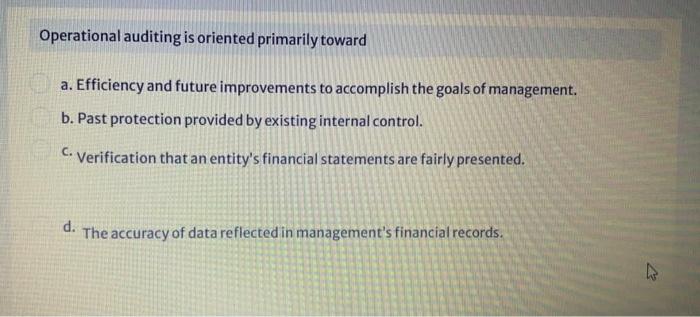Operational auditing is oriented primarily toward evaluating the efficiency and effectiveness of an organization’s operations. By examining processes, systems, and controls, operational audits aim to identify areas for improvement, enhance risk management, and ensure compliance with regulations.
This comprehensive approach involves analyzing data, assessing internal controls, and evaluating performance metrics to provide valuable insights and recommendations for optimizing organizational operations.
Operational Auditing Objectives: Operational Auditing Is Oriented Primarily Toward

Operational auditing is primarily focused on evaluating the efficiency, effectiveness, and compliance of an organization’s operations. Its objectives include:
- Assessing the adequacy and effectiveness of internal controls
- Identifying areas for improvement in operational processes
- Ensuring compliance with regulatory requirements
- Providing recommendations for enhancing operational performance
Audit Scope and Coverage
Operational audits typically cover a wide range of areas within an organization, including:
- Financial operations (e.g., revenue recognition, expense management)
- Operational processes (e.g., production, supply chain management)
- Information technology systems (e.g., data security, system controls)
- Human resources management (e.g., employee hiring, performance evaluation)
The extent and depth of audit procedures depend on the size, complexity, and risk profile of the organization.
Audit Methods and Techniques
Operational auditors use a variety of methods and techniques to gather evidence and assess operational performance, including:
- Interviews with key personnel
- Observation of operations
- Review of documentation
- Data analysis
- Process mapping
The specific techniques used depend on the audit objectives and the nature of the operations being audited.
Data Collection and Analysis
Data collection is a crucial step in operational auditing. Auditors gather data from a variety of sources, including:
- Financial statements
- Operational reports
- Employee records
- Customer surveys
Auditors use data analysis techniques to identify trends, patterns, and anomalies that may indicate areas for improvement.
Reporting and Communication
Operational audit reports typically include the following elements:
- Executive summary
- Findings and recommendations
- Supporting evidence
- Management’s response
Auditors communicate their findings and recommendations to management through a variety of channels, including meetings, presentations, and written reports.
Value and Benefits of Operational Auditing, Operational auditing is oriented primarily toward
Operational auditing provides numerous benefits to organizations, including:
- Improved efficiency and effectiveness of operations
- Reduced risk of fraud and errors
- Enhanced compliance with regulatory requirements
- Increased stakeholder confidence
Operational auditing is a valuable tool for organizations seeking to improve their overall performance.
Challenges and Limitations
Operational auditing can be challenging due to:
- The complexity of modern business operations
- The lack of standardized audit methodologies
- The potential for bias and subjectivity
Despite these challenges, operational auditing remains a valuable tool for organizations that are committed to continuous improvement.
Emerging Trends in Operational Auditing
Operational auditing is constantly evolving to keep pace with the changing business landscape. Emerging trends include:
- The use of technology and data analytics
- The focus on risk management
- The adoption of agile audit methodologies
These trends are shaping the future of operational auditing and will continue to impact the way that organizations assess and improve their operations.
FAQ Corner
What is the primary focus of operational auditing?
Operational auditing focuses on evaluating the efficiency and effectiveness of an organization’s operations.
What are some common objectives of operational audits?
Common objectives include assessing internal controls, reviewing financial transactions, and evaluating operational performance.
How do operational audits contribute to organizational value?
Operational audits provide valuable insights and recommendations that enable organizations to improve efficiency, reduce risks, and enhance compliance.


